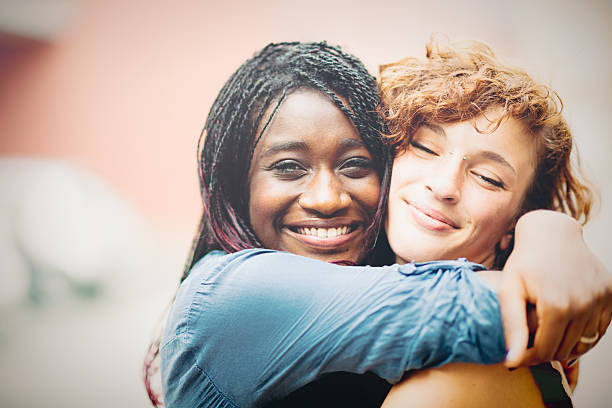Intimate Communication Series: Mindful Intimacy Part 3
Mindful Intimacy: Empathetic Communication
Intimate Communication Series: Mindful Intimacy Part 2
Mindful Intimacy: The Power of the Pause
Intimate Communication Series: Mindful Intimacy Part 1, The Power of the Pause.
Why Have Relationships, Anyway?
When I coach couples and individuals about relationships, the question, “why have relationships?” comes up in two very different contexts.
Why Have Relationships At All?
The first context is one of despair. Relationships have been so difficult, so painful, so exhausting, that someone starts to ask themselves, “why do I do this at all?” and, “would I be better off being alone for the rest of my life?” They may begin to think that loneliness is just the price they have to pay for peace of mind.
The second context is one of maturity. After working through childhood wounds, neediness, and attachment, someone contemplates the reality that they can provide for themselves anything they might seek from outside. As the possibility of this state begins to dawn, people are often gripped with a concern that being self-sufficient might remove any motivation they have for being in relationships at all.
Discouragement: When Relationships Are A Struggle
We could spend an entire article talking about why relationships can be such a struggle, but for now, just bear in mind that what makes relationships difficult is the interaction of our own childhood wounds with another person’s childhood wounds.
The long-term solution is, of course, to do the internal work to heal our childhood wounds through therapy, meditation, self-parenting, rebirthing, and other personal development practices.
In the short term, however, there is a practical way to end the apparently eternal struggle; simply stop engaging with people whose childhood wounds trigger yours. If they are relatives or work associates, take some polite distance. If they are friends or lovers, politely take a break from seeing them.
Now, if you have been deep in your habitual patterns, this may mean distancing yourself from almost every person you know. This is not a bad thing. You won’t be alone for long – the world is full of people who don’t trigger your childhood wounds. As soon as you have some time, space, and emotional energy for interaction, they will be right in front of you, ready to have low-drama relationships with you.
Just be careful not to select a whole new crop of drama-triggering friends and lovers. If all your relationships have always been difficult, then you are probably really good at gravitating to people whose childhood wounds trigger yours. You will need to avoid the people you consider attractive, interesting, and exciting, and get to know some of those boring people you have always ignored.
Maturity: When You No Longer Need Anything From Relationships
The idea that we wouldn’t bother with relationships if we didn’t need anything from anyone doesn’t usually arise after someone has completed their healing journey and attained true independence. It is more likely to arise during the healing journey, as an objection to the idea that we can (or should) be meeting our own needs internally, rather than looking to other people to meet our needs.
In reality, once we move out of neediness and dependence on others, we can begin to have authentic relationships for the first time in our lives. A whole new world opens up, with unimaginable pleasures, unprecedented fulfilment, and capabilities that literally seem like superpowers.
The long climb out of the depths of chaos, pain, and confusion is just the beginning. Once we stop grasping at others to save us, to support us, to fill a hole within us, once we are whole and complete within ourselves, then (and only then) can we truly meet another person, soul to soul.
When two complete beings meet in trust and harmony, we unleash the power of synergy – the world in which the whole is greater than the sum of its parts. Instead of finding our “other half” and becoming whole, we bring two wholes together. Like two pieces of nuclear fuel combining to reach critical mass, we fuse together and access the cosmic alchemy by which we become, for a while, something more than merely human.
Written By Jnani Jenny Hale
The Surprising Power of a Broken Heart
The last time you had a broken heart, did you spend a lot of energy wishing it hadn’t happened? Trying to fix it?
We often view having a broken heart as being a victim, whether someone else broke up with you or you lost a loved one to cancer or you moved across the country and it ended a deep relationship. I would like to submit another angle for heartbreak: that it’s the best medicine for knowing, accepting, and loving ourselves.
It leads us to show up more as our whole self.
Most of us have layer upon layer of walls around our hearts, hence we don’t let people see us as the full human we are. We don’t even see ourselves fully. Breaking our hearts, in whatever way that happens, can cause enough of a shift to let new parts of us be revealed.
Read the full article at Beducated.
It Exists: The Tantric Quickie
Have you been thinking that Tantric sex means slow sex?
Slow sex is delicious. It helps us become more aware and attentive to all the sensations, obvious and subtle, that we exchange with another body during lovemaking. But Tantric sex isn’t defined by its speed or duration.
Tantric sex is goalless.
It’s free of expectations. It’s full of a love without attachment. Tantric sex is as deep as the moment allows. And it’s present with what the moment calls for.
I’m all up for slow, all-night lovemaking. Sometimes. I’ll be honest – I like to go to bed early, and I can get tired during the all-night marathons. For me, the Tantric quickie can be just as deep and profound, earth-shattering, and laughter and tear-filled as a longer love-making session.
I also love the excitement of a time limit, a secret hiding place, pulling off the road in a secluded forest, or needing to be really quiet so others don’t know you’re doing it.
Here’s a little “how to” on the Tantric Quickie. Note that these are not rules, they are simply guidelines to keep you on the track of freedom for your afternoon delight, late-night snack, or pit-stop. You make the rules if you need them. And you demolish the rules that don’t serve and keep you limited by stories of right and wrong.
So What the Heck is Unconditional Love?
I was raised saying, “I love you” to my friends, family, and intimate partners. And while this phrase was freely given as a child, as I grew up I developed a need to know I was going to hear it back before I said it.
Only in the last few years did I learn that this kind of love is conditional. As you may have already realized in your life, this can create a lot of suffering.
In my current partnership, we have agreed to return to unconditional love no matter what. For us, this means regardless of what happens, who hurts who, where trust has been breached, or how much we want to hold a grudge or not forgive each other, we choose to love. We choose to peel back what’s in the way and remember that we are love without needing to do anything.
But, What is Unconditional Love?
Is it really possible to love no matter what? What might it mean to love without any conditions? Without concern, if that love is reciprocated or received? Regardless of how we are treated?
Would it look something like Jesus saying of his crucifiers, “Forgive them, Lord. They know not what they do”? Thinking about the people who have figuratively crucified me, my response is usually quite different. It’s more like, “You’re such a $@%*(%#.”
It makes sense that most of us have no idea what unconditional love is.
Read the full article at Beducated.
Mindful (S)expectations
Oh, the tangled webs we weave when we pretend to not have expectations. Talk about setting yourself up for failure.
It’s a funny thing, really, to walk into a long-anticipated connection with an intimate partner and think that you’re both coming in with the same intentions and emotions. Last September, my lover Lila and I met in Mexico, after 2 months of being apart.
Instead of talking about our expectations and where we currently were, we just showed up, without too much communication over the previous month.
We tried to believe that all would go swimmingly, while secretly asking ourselves:
Would we love each other the same?
Would we still see the Goddess in one another?
Would we be as hungry for each other as we were the last time?
Would the changes in our other lovers change how we related? For better or worse?
We didn’t actually ask any of these questions aloud.
What we did do was show up with a whole truckload of unspoken expectations and fears. Seven days later, we parted ways again – me to Mexico for the fall and Lila back home to Sydney – having returned to the bliss of remembering our deep love for one another and the recognition of the Divine in our connection.
But it wasn’t fucking easy. Shit came up. Again and again.
And what did we do?
We remembered that conflict is actually part of a relationship. And we didn’t let each other walk away.
Read the full article on Omooni.
Delving into Polyamory
Last week I got to speak with Nikki Leigh who hosts a radio show called Ready for Love. We talking about lots of juicy details in polyamory and nontraditional relationships. Check it out here!
Here is the link to the full 1 hour show (scroll down the page to find the recording.) Please leave a comment and let me know what resonated with you!
http://www.readyforloveradio.com/delvingpolyamory/
Some Things We Discussed –
- Monogamy & Polyamory
- Partnership & Lovership (love this term)
- What is the best thing about polyamory?
- What is New Relationship Energy?
- Jealousy in Polyamory
- What does showing up authentically in a relationship mean?
- … and much more
Interesting Quotes and Links
“Definitions are important – not to categorize, but to speak the same language.”
“I truly love the interconnectedness of non-monogamy.”
Poly 101 – Definitions https://www.morethantwo.com/poly101.pdf
Terms – http://www.readyforloveradio.com/non-monogamous-terms-and-concepts/
Jealousy in Polyamory
If you practice nonmonogamy, you might have already been through the new and shiny phenomenon, where you or a partner meets someone new and it awakens the fun, unpredictable New Relationship Energy (NRE).
This could go a number of ways. Two of the most common are:
- It kicks up a new appreciation and desire in your existing relationship
- You find yourself comparing your new love to your current relationship
Obviously, option one is preferred. Without awareness, option two can easily happen…but it doesn’t have to. Let’s see how to deal with jealousy in a polyamorous relationship and examine the habits that can lead to a comparison of new love with existing and how to create patterns that help NRE fuel your existing love, not necessarily create a desire to replace.
The Mind’s Task of Comparison
Comparison is one of the fastest paths to disaster in poly relationships.
Even if we think we don’t compare partners or past relationships, our mind and ego are constantly on the lookout for better or worse. That’s our mind’s job, to put things in order (*note: hierarchy) so it can have linear thoughts. While we don’t need to despise our mind for its instinctual task, we can recognize that it creates a lot of suffering.
In fact, most suffering comes from this desire of the mind to separate, identify and compare.
When this sets one relationship against another, we get just that: a fight. Who’s the better lover? Better partner? Better listener? This is what the mind will ask you and desperately try to get you to answer.
Continue reading the full article at omooni.com.





